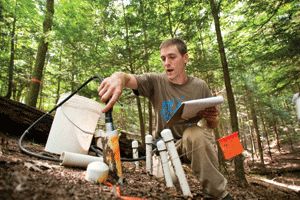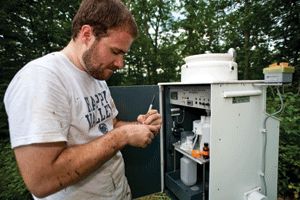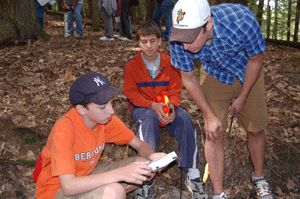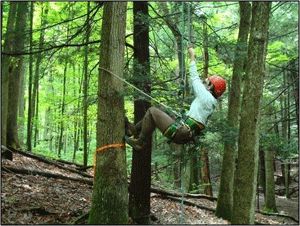Do not fill out this information.
On this particular page, the Initial Text and Image fields for this template are not used (inactive). A Carousel Slideshow is displayed instead.
To edit the Carousel Slideshow, Choose Edit Existing > Carousel Slides. Then navigate to your CZO's entry entitled "About"
We are a nationally funded Critical Zone Observatory established in 2007. Our research promotes the understanding of how a forested, first-order catchment of shale bedrock evolves over multiple time scales in a temperate climate.
Nick Kaiser, summer REU student, collecting soil respiration data from the south swale transect within Shale Hills, PA.
Building upon the Past
George Holmes, MS alum from Civil and Environmental Engineering, collects precipitation samples from the Eigenbrodt NSA-181S for isotope analysis.
Education and Outreach
Postdoctoral Scholar Chris Graham works with the local high school "pre-term freshman" in the first STEM academy offered at the CZO in August of 2010.
Opportunities
The Susquehanna Shale Hills CZO offers outstanding multidisciplinary opportunities for research collaborators and especially for graduate-student research. To schedule a field visit or take advantage of our data and infrastructure, please contact the CZO PI, Sue Brantley; the CZO National Coordinator, Tim White; or the CZO Program and Data Coordinator, Brandon Forsythe.
Nick Kaiser, summer REU student, collecting soil respiration data from the south swale transect within Shale Hills, PA.
George Holmes, MS alum from Civil and Environmental Engineering, collects precipitation samples from the Eigenbrodt NSA-181S for isotope analysis.
Postdoctoral Scholar Chris Graham works with the local high school "pre-term freshman" in the first STEM academy offered at the CZO in August of 2010.
Jane Wubbles, MS alum from Ecology, demonstrates the art of "Tree Climbing," a skill necessary for leaf and small branch collection in the upper-most canopy.
Associated Files
SSHCZO Organization Chart - September 2017
(134 KB pdf)
Organizational chart of the Susquehanna Shale Hills Critical Zone Observatory
Susquehanna Shale Hills CZO
Pennsylvania
Established 2007
"We emphasize quantitative prediction of Critical Zone creation and structure, focusing on pathways and rates of water, solutes, and sediments"
Science Questions:
- How does water sculpt a landscape on shale bedrock?
- What controls the hydrologic and elemental budgets of the catchment?
- What are the rates and mechanisms of important hydrological, ecological, and geochemical processes?
Our CZO is a forested, first-order catchment on shale bedrock in a temperate climate.
Our research promotes understanding of how the forested catchment evolves over multiple timescales ranging from the meteorological to the geological.
Explore Further





